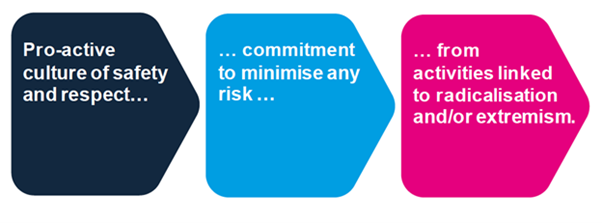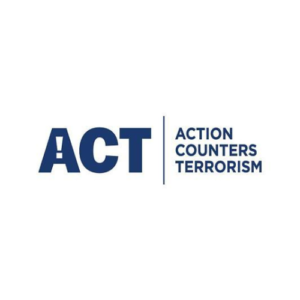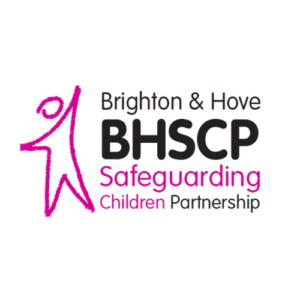Team Domenica Policy for the Prevention of Radicalisation and Extremism
Author: Sara Fletcher (Education and Quality Lead)
Consulted: Lisa Campbell Squires (Co-CEO), Deborah Rayner Grey (Pastoral Lead).
Date last reviewed: August 2025
Renewal due: August 2026
Legislation and Guidance
Please note that this is intended to provide useful links to relevant guidance and legislation. It is not an exhaustive list:
- Prevent duty guidance – GOV.UK
- Keeping children safe in education – GOV.UK
- The Prevent Duty: safeguarding learners vulnerable to radicalisation
-
Prevent duty guidance: England and Wales (2023) – GOV.UK
- Counter-terrorism strategy (CONTEST) 2023 – GOV.UK
- Prevent in Brighton & Hove
Associated Documents
- The Team Domenica Online Safety Policy
- The Team Domenica Policy for Promoting Positive Relationships and Behaviour
- The Team Domenica Safeguarding Policy
- The Team Domenica Curriculum Policy
- The Team Domenica Prevent Risk Assessment (available to relevant parties upon request)
Introduction
Team Domenica is committed to a culture where all candidates, staff and volunteers can develop and thrive in a proactive culture of safety and respect.
Included in this is a commitment to minimise any risk from those who seek to cause harm through activities linked to radicalisation and/or extremism, including situations where this could potentially lead to acts of harm to the self and others; and/or criminalisation and the impact this may have on an individual’s life and development.

The Aims, Purpose and Scope of This Policy
The aims of this policy are to:
- outline the steps that are taken to prevent any such risks from occurring for our candidates while they are at Team Domenica
- define those behaviours which are unacceptable
- support our candidates in recognising any risks that arise in their wider lives
- ensure that any such incidents are dealt with swiftly, safely and effectively with all relevant agencies
Any incidents, allegations and concerns of harm to a candidate related to the conduct of employees, volunteers or members of the public are managed via the Team Domenica Safeguarding Policy.
All staff working at Team Domenica, whether they have front line roles (teachers, training mentors, café staff and job coaches) or not, are responsible for the implementation of this policy which is to be read alongside the Safeguarding Policy, the Policy for Promoting Positive Relationships and Behaviour and The Online Safety Policy.
This Policy is informed by the Revised Prevent Duty for England and Wales and Keeping Children Safe in Education 2024 (but developed to be relevant for the abilities, needs and age of the candidates at Team Domenica and the context in which they work and learn).
Context
Team Domenica recognises that protecting our candidates, community and culture against extremism means ongoing vigilance around the attitudes and practice of staff, governors, volunteers, candidates, employers as well as influences from the outside world both online and off-line. While our teaching, training and mentoring staff have a duty to support candidates in discussing and exploring complex and potentially controversial topics, this must be done within professional boundaries that include proportionate and balanced views, a clearly taught understanding of the difference between fact and opinion, and resources that are appropriate.
Allowing extremist views to go unchallenged is detrimental to our positive and safe culture in which all participants should feel valued and included, never threatened or marginalised. Extremism thrives on discord and mistrust between groups in the community and it is essential staff challenge any extremist views they encounter in the classroom, workplace or other spaces whenever they arise.
Extremist views may be expressed explicitly but staff must also be aware of more implicit comments and actions, for example through clothing, tattoos or musical choice. This approach – coupled with a clear and balanced curriculum for both teaching about respect, tolerance, diversity and equality, and equipping learners with critical thinking skills – is at the heart of maintaining an ethos that is inclusive and safe.
It is a duty under this policy that staff share concerns about extremist views shared by candidates, colleagues, volunteers, contractors, work placement staff or the public so that managers or leaders can take the right steps, including the use of relevant behaviour and staff conduct policies as necessary.
Definitions
Extremism Definition: Extremism is the vocal or active opposition to our fundamental values, including democracy, the rule of law, individual liberty and the mutual respect and tolerance of different faiths and beliefs. This also includes calling for the death of members of the armed forces.
Radicalisation Definition: Radicalisation refers to the process by which a person comes to support terrorism and extremist ideologies associated with terrorist groups.
Terrorism Definition: Terrorism is an action that endangers or causes serious violence to a person/people; causes serious damage to property; or seriously interferes or disrupts an electronic system. The use or threat must be designed to influence the government or to intimidate the public and is made for the purpose of advancing a political, religious or ideological cause.
Specific Threats
All staff need to be aware of the major threats in the UK and in the local area. To ensure this safeguarding leads, are signed up to the Education Sector Network run by Nahida Shaik, Brighton and Hove’s Prevent Lead officer. As part of this network Team Domenica has sight of the Brighton and Hove Counter Terrorism Local Profile Headline Summary, which informs our Prevent Risk assessment.
At the time of writing (August 25) these include:
- Extreme right-wing terrorism, including neo-Nazis ideologies.
- Mixed, Unstable or Unclear’ ideologies including those associated with the incel movement.
- Islamist terrorism mainly connected to al-Qaeda (AQ), ISIS and ISIS-inspired terrorists (also known as ISIL, Daesh or the Islamic State)
- Northern Ireland related terrorism (NIRT)
- Extreme left-wing, anarchist and single-issue terrorism including animal rights/environmental extremism (LASI)
- There has been a sharp increase in religious-hate incidents in Brighton & Hove, largely tied to global events. Between early 2023 and December 2023, recorded religiously motivated hate crimes rose to 99 incidents, compared to just 63 the previous year and 43 in an earlier comparison period.
- The rise reflects heightened incidents of anti-Semitism and Islamophobia, particularly in the aftermath of the Hamas–Israel conflict, with local protests and even terrorism-related arrests underscoring the tensions.
While staff need to be alert to all threats it is particularly highlighted in this edition of this policy that the biggest growing terrorist threat in the UK, and locally, at the time of writing, is Self-Initiated Terrorism wherein both specific and generalised discontent with perceived injustice leads to an individual taking action alone, after accessing instructions on how to cause harm online.
Research indicate that Mental health conditions, Autistic Spectrum Conditions and additional learning needs may be indicators of susceptibility to the risk of being drawn into terrorism for both young people and adults. However, as with any concern, a thorough person-centred approach to risk assessment will always be undertaken.
Of particular concern are menist/incel forums that not only promote a harmful ideology but also promote self-harming behaviours. It is also recognised locally that there is a post-pandemic susceptibility to both social isolation and the promotion of conspiracy theories.
Appendix 2 contains several links to resources for advice and guidance, and to curriculum materials for the support of both teaching and learning activities and staff understanding.
Social isolation or marginalisation, reduced contact with supportive agencies a lack of empathy around the personal costs and impacts of terrorism, spending a lot of time online and a tendency to see the world in very binary ways may mean that some individuals lack the skills to discern between reality and propaganda, are easily swayed to a simplistic world view and easily recruited to online and real world hate groups.
Therefore, all staff working with our candidates need to be aware of the signs that radicalisation might be occurring. These include:
- Becoming secretive or withdrawn from established peer groups
- Using language that is prejudicial or discriminatory
- Developing hostility to others and being unwilling to discuss and debate views
- Sharing materials that are extreme, including those involving weapons, explosives and military training
- Having a sudden knowledge of facts and statistic around certain topics that are unverifiable
- Talking as if from a script
- Having new social groups that are all consuming and which may seem to be offering material reward or which seem to cause fear and anxiety.
Preventing Extremism and Radicalisation
There are four aspects to the work Team Domenica carries out to prevent the expression of extremism and the risk of radicalisation:
Culture – Team Domenica actively promotes a culture where no one person or group is seen as less important, capable or deserving than another group or individual. Respect and tolerance of difference in belief, appearance and identity should be promoted at all opportunities presented and in the planning of materials, activities and classes, as well as in less formal interactions. Advocacy and the amplification of the learner voice is also an essential component of a representative culture.
Curriculum – Team Domenica’s Relationship, Personal, Social and Health Education sessions explicitly teach learners about the risks of radicalisation, the role of democracy in British life and the rule of law, including the impact on life chances if the law is broken. Where possible partner agencies and external speakers are used to help promote these messages. Enrichment sessions promote relationships with the wider communities of Brighton and Hove and foster respectful relationships between candidates, promoting tolerance and respect.
Online Safety – As described above there are particular risks of radicalisation presented to our candidates on-line that could lead to harm to the self and others. Team Domenica has to balance the choices and autonomy of young adults with the need to establish the training environment as a safe environment with the boundaries necessary for appropriate, professional and lawful activities. Therefore, Team Domenica has a web filter that actively blocks extremist materials on all devices provided by the organisation and used in class and training activities. Candidates are able to access their own devices in break times and are informed of the boundaries and expectations of appropriate usage in a workplace. This is underpinned by a user agreement displayed in the classroom. Teaching and training staff are alert to the changes in behaviour and presentation that may be associated with viewing damaging online materials in free time.
Mentoring – The young adults attending Team Domenica as candidates are negotiating a significant life transition as they move from school or college to the workplace, are supported by adult services with expectations of agency and accountability, and experience some change in their family relationships, including leaving home in some cases. This provides many opportunities for growth but also raises new risks. It is essential that consistent opportunities for attuned and sensitive one-to-one work are available throughout our programme.
Visitors and Speakers
Team Domenica believes that learning is best consolidated by a rich variety of activities both on site and in the community and to support this our RSHE and Enrichment Curriculum access a number of visitors, speakers a well as coaches and trainers for off-site activities.
Visitors, and those we visit contribute to the life and learning of the college and the experience and opportunities they bring are encouraged and appreciated.
It is the college’s responsibility to ensure that security and welfare of the whole college community is not compromised at any time. It is our aim to make sure that our college is protecting students and staff during college time and in extracurricular activities and to ensure that visitors and those we visit comply with the Visitors & Partners Agreement (See Appendix 3).
“External Speaker”/ “Visitor”/ “Partner” are used to describe any individual who is not a student or staff member of our college who leads or co-leads all or part of a learning activity or who interacts with candidates for a substantial part of a learning activity by invitation of Team Domenica. All such activities organised with “External Speaker”/ “Visitor”/ “Partner” in and outside of our college building are still within the responsibility (and liability) of our college.
Our college will assess the suitability and effectiveness of input from external agencies, individuals or speakers or individuals to ensure that:
- Any messages communicated to students support British Values and Team Domenica’s values
- Any messages communicated to students are consistent with the ethos of the college and do not marginalise any communities, groups or individuals
- Any messages communicated to students do not seek to glorify criminal activity or violent extremism or seek to radicalise students through extreme or narrow views of faith, religion or culture or other beliefs and ideologies (must not incite hatred, violence or call for the breaking of the law)
- Activities are matched to the needs of students
We recognise, however, that the ethos of our college is to encourage students to understand opposing views and ideologies, appropriate to their understanding and abilities, and to be able to actively engage with them in informed debate, and we may use external agencies, individuals or speakers to facilitate and support this. It is essential that this policy is not used to impair discussion or freedom of speech.
Organising the event
When organising an event covered by this policy agreement from the Head of College and/or the Head of Admissions, Safeguarding and Pastoral Care must be sought in advance. They should be given a clear explanation as to the relevance and purpose of the visit and intended date
and time for the visit. Our college reserves the right to cancel, prohibit or delay any event with an external speaker if this Policy is not followed or if health, safety and security criteria cannot be met.
The member of staff (organiser) who has invited the visitor to college is responsible for the activities that take place within their lessons/events. The organiser must ensure that all speakers/visitors are made aware of their responsibility in-line with the college’s Safeguarding Policy and have read and signed the Visitors and Partner’s Agreement (Appendix 3).
The organiser will conduct a short check into all potential speakers using an open-source check: searching the speaker and any organisation the speaker is affiliated with, on a suitable search engine and look at the first three pages of results. They will then repeat the search with ‘controversy’ added to the search terms. If the speaker has a history of or has in the past been accused of any of the following, the details for the booking will to be sent to the Designated Safeguarding Lead.
The organiser will also not arrange any candidate focused activity without speaking personally to the visitor/partner to ensure they will carry out the activity in such a way that is aligned with our values.
The event will not go ahead as planned if there is any perceived risk that it may involve:
- Inciting hatred, violence or calling for the breaking of the law
- Insulting or making derogatory remarks to other faiths or groups
- Using threatening, abusive or insulting words or behaviour
If no issues are identified, then the event/speaker will proceed with event confirmation.
In particular Team Domenica will not permit any activity that includes:
- Any person or group on/or linked to the UK Government list of proscribed terrorist organisations
- Talks by organisations generally considered to be extremist by Home Office and related organisations
- A speaker who is known to have spoken previously at another institution on a topic that has caused fear or intimidation of students or staff
- A speaker accepted in mainstream as being highly controversial
- A speaker known to/or likely to cause harm to a specific group of staff or students
- A link or links, to any person or group that has, in those search engine listings, been connected with any controversy of a negative or positive nature
- A speaker who has significant profile and attracts a following that could create crowd control and health and safety issues
The safeguarding leads will also consider what external referrals and/or support may be needed in any such circumstance.
Responding to concerns about radicalisation and extremism
All incidents of concerning behaviour must be reported on the organisation’s MyConcern platform, following the procedures and principles outlined in the Team Domenica Safeguarding Policy. This means concerning behaviour shown by the candidate or which the candidate reports as having experienced from others, in real life or online.
If, upon receipt of a report, or a pattern of reports, the safeguarding team believes an individual is susceptible to radical ideologies or is, or at risk of, being encouraged to act in support of extremism or terrorism they will make a referral to the Sussex Police Prevent Team, following the procedures in Appendix 1.
If this happens, a plan for both risk management and pastoral/individual support will be considered.
If anybody suspects that a specific act of terrorism is threatened, they should dial 999.
Training
From September 2023 we are replacing commercial online training with that available via the home office (Prevent duty training: Learn how to support people susceptible to radicalisation) for new staff and for those due for their two-year refresher. Education Leaders and Designated Safeguarding team members also access local training and updating events to stay aware of the current issues and threats in the area.
Appendix 1:The Referral Process
In advance of any referral, guidance and support can be gained locally by discussion with:
The Channel Co-ordinator based at the Safer Communities team in Brighton and Hove City Council at: Channel.Prevent@brighton-hove.gov.uk or call on 01273 291115
The Brighton and Hove City Council Prevent Lead/Co-ordinator:
Nahida.Shaikh@brighton-hove.gov.uk or call 01273 290584 or 07717 303292
Appendix 2a: Resources
Appendix 2b: Support, Information and Specialist Organisations
Appendix 3
Click here to download Appendix 3: Team Domenica’s Visitors, Speakers and Partners Agreement
Read the rest of our organisational policies

 Action Counters Terrorism (ACT)
Action Counters Terrorism (ACT)  National Education Union
National Education Union  End Violence Against Women and Girls
End Violence Against Women and Girls Educate Against Hate
Educate Against Hate  Equaliteach article with resources
Equaliteach article with resources Brighton & Hove
Brighton & Hove Online extremist and terrorist content
Online extremist and terrorist content Hope Not Hate
Hope Not Hate Prevent
Prevent The Terrorism Act 2000 (TACT 2000)
The Terrorism Act 2000 (TACT 2000) Local Support and Referrals
Local Support and Referrals 